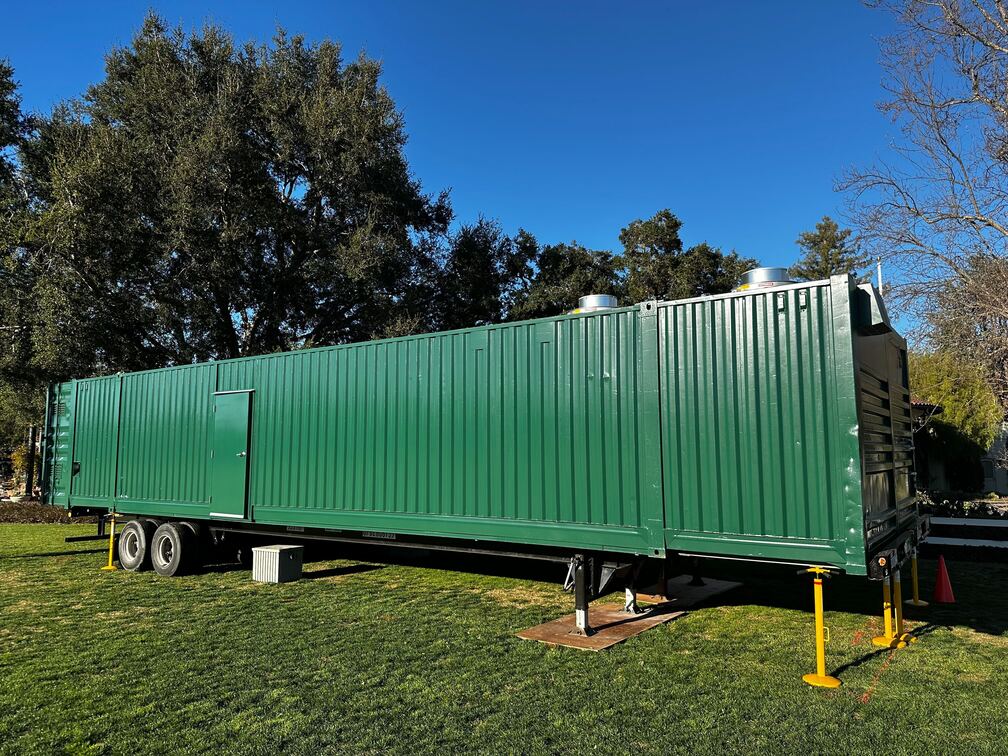
Introduction
Summer brings big outdoor events, from music festivals and culinary showcases to weddings and corporate galas. Without a central kitchen in place, foodservice becomes a logistical nightmare. Picture this: your resort is hosting a high-profile culinary festival but the venue lacks kitchen infrastructure. Building a permanent kitchen isn’t feasible. Time is tight. The solution? A mobile kitchen trailer that is fully equipped, code-compliant, and ready to deploy.
In fact, the global temporary kitchen hire market was valued at USD 2.5 billion in 2023 and is projected to exceed USD 3.9 billion by 2032. This growth reflects surging demand for rapid, flexible kitchen infrastructure across large-scale festivals and private events.
In this article, we examine when and why mobile kitchens are rented for events and festivals, focusing on the operational, regulatory, and financial reasons behind these decisions. You'll also gain insight from real-world case studies showcasing how a premium mobile kitchen from Mobile Culinaire delivers high-capacity and safe foodservice under event pressure.
What Is a Mobile Kitchen?
A mobile kitchen trailer is a self-contained cooking unit designed to deliver professional-grade food service capabilities wherever they’re needed. Outfitted with commercial kitchen equipment (such as ovens, fryers, prep stations, refrigeration, and ventilation), these units replicate the functionality of a permanent restaurant kitchen.
For an in-depth introduction to mobile kitchens, read our article here.
The Rising Need for Mobile Kitchens at Events and Festivals
Events today are more ambitious and food expectations are higher than ever before. Whether it’s a wine and food expo, a regional music festival, or a beachfront wedding, guests demand top-tier dining experiences even in remote or temporary settings. According to industry analysts, the catering equipment rental market is expected to reach USD 433.9 million by 2032, driven by the popularity of mobile kitchens at events requiring health-code-compliant foodservice in infrastructure-limited settings.
Several factors are driving demand for mobile kitchen rentals:
- Increased guest volumes: Festivals now serve 10,000+ attendees, necessitating high-output kitchens.
- Venue limitations: Many scenic or outdoor event sites lack any food service infrastructure.
- Health and safety codes: Organizers must meet strict regulations, even for temporary operations.
- Flexibility and speed: Mobile kitchens can be deployed rapidly and reconfigured as needs shift.
- Cost savings: Renting a mobile kitchen eliminates the capital and permitting costs of building temporary structures. Rental cost for a smaller trailer kitchen costs between USD 450 to USD 1600 per day.
20(1).jpeg)
When Are Mobile Kitchens Rented for Events & Festivals?
Large-Scale Music & Art Festivals
High-traffic festivals like Coachella or regional events require multiple high-output food stations. Mobile kitchen rentals empower vendors and caterers to prepare and serve thousands of meals on-site efficiently, while meeting safety codes.
Corporate Events & Brand Activations
Product launches, trade expos, and retreats demand on-brand culinary experiences. Mobile kitchens offer customizable layouts, brand visibility, and controlled service quality, ideal for impressing clients, employees, or media guests.
Food & Beverage Expos or Culinary Competitions
Events like cook-offs and tastings require uniformity and professionalism. Mobile kitchen trailers provide modular, compliant setups for chefs and contestants, ensuring fairness, safety, and operational consistency.
Weddings and Private Celebrations
Outdoor weddings, reunions, and remote celebrations often lack access to full kitchens. A mobile kitchen for lease supports everything from cocktail hour hors d’oeuvres to elegant plated dinners, without sacrificing ambiance or flow.
Renovations, Emergencies, or Utility Failures
When existing facilities are under renovation or suffer unexpected outages, mobile kitchens act as temporary culinary lifelines, keeping operations uninterrupted and revenue flowing during otherwise service-halting disruptions.
.jpeg)
Why Mobile Kitchens Are Ideal for Events and Festivals
Unmatched Flexibility & Scalable Design
Whether you’re running a single chef station or a multi-line culinary operation, mobile kitchen trailers scale to meet demand. Units can be tailored to the service style (buffet, à la carte, or catering) and expanded with additional trailers to support VIP zones, beverage prep, or specialty diets. No two events are the same, and mobile kitchens adapt in real time.
Rapid Deployment with Minimal Overhead
Unlike tented kitchens that require weeks of permitting, floor planning, utility installation, and custom builds, mobile kitchens arrive ready for service. Most units can be connected to power and water within hours, slashing setup time, labor costs, and administrative burden. It’s a turnkey solution engineered for speed.
High-Volume & High-Performance Production
Designed for durability, mobile kitchens are built to endure peak service hours at large-scale events. With commercial fryers, combi ovens, flattops, and ample prep surfaces, crews can maintain pace without sacrificing consistency or quality. This level of performance is critical when serving hundreds, if not thousands of covers per service window.
The U.S. alone has seen mobile kitchen businesses grow from just 8,700 in 2011 to over 35,500 today, reflecting how widespread and normalized this infrastructure has become for high-volume, fast-paced event environments.
Operability in Remote or Infrastructure-Limited Locations
From mountain-top weddings to beachfront festivals, mobile kitchens thrive where traditional setups fail. Self-contained systems with onboard generators, fresh water tanks, and gray water holding ensure uninterrupted operation even in off-grid environments. You don’t need infrastructure, you need innovation.
Compliance and Risk Mitigation
Public health agencies like the CDC emphasize the importance of maintaining sanitary food prep environments, particularly in temporary or mobile settings. Every unit comes compliant with fire suppression systems (per NFPA 96), non-slip surfaces, and NSF-rated equipment, ensuring rapid pass-through of inspections. For event organizers, this means reduced liability and a lower risk profile across the board.

Use Cases Examples of Mobile Kitchens in Events & Festivals
Major Music Festivals
Large music festivals often span several days and attract tens of thousands of attendees. Food vendors must serve meals quickly, safely, and at scale, often without access to permanent infrastructure. Mobile kitchens offer a flexible, high-capacity solution, allowing multiple vendors or catering teams to operate simultaneously with full cooking and prep capabilities.
Example:
At a summer music festival in the Pacific Northwest, organizers deployed four mobile kitchen trailers to support over 20 food vendors. These units helped reduce wait times and enabled consistent and high-quality food service across the venue.
Vineyard and Scenic Pop-Up Dinners
Pop-up dining experiences in scenic or remote locations, like vineyards, mountaintops, or coastal venues, require full kitchen functionality without fixed infrastructure. Mobile commercial kitchens provide chefs with the tools they need to prepare gourmet meals on-site, ensuring restaurant-level quality in off-grid settings.
Example:
In Napa Valley, a summer-long pop-up dinner series used a mobile kitchen to host Michelin-starred chefs in different vineyards each weekend. The mobile unit included convection ovens, prep counters, and refrigeration, allowing seamless execution in elegant outdoor settings.
Corporate Activations & Brand Tours
Brands conducting experiential marketing tours, especially those offering tastings or food-related demonstrations, require consistent and mobile culinary infrastructure. A mobile kitchen trailer can be custom-branded, equipped for demo cooking, and easily relocated from city to city.
Example:
A national beverage company used a custom-wrapped mobile kitchen trailer for its 12-city tasting tour. The unit allowed them to host cooking shows, serve branded food items, and maintain a consistent presence across urban and college venues.
%252520(1)%2520(1).jpeg)
Choosing the Right Mobile Kitchen for Events and Festivals
Event Type and Guest Count
Your event’s scope sets the foundation for kitchen selection. For example:
- Small private functions (e.g., weddings or fundraisers) may need compact mobile units for 100–150 meals.
- Large-scale public events (e.g., fairs, music festivals) often require multiple high-output kitchen trailers with designated prep, cook, and service zones.
Location Constraints
The geographic setting directly affects which kitchen configuration is viable:
- Remote/off-grid locations may need self-contained units with generators, water tanks, and propane systems.
- Urban spaces may face restrictions on vehicle size, placement, or noise levels.
Population Demographics
Understanding who you're serving is critical when designing your kitchen's flow and menu:
- Family-oriented events may prioritize safe, allergen-friendly, and fast-service food.
- Corporate VIP events may demand upscale menus requiring precision equipment and larger prep areas.
- Culturally specific gatherings may need specialized appliances like tandoors, wok ranges, or rotisseries.
Deployment Duration
How long the kitchen will be in use affects everything from utility infrastructure to layout:
- Single-day events benefit from towable trailers with minimal setup time.
- Multi-day or seasonal events may need modular kitchens with expanded dry storage, waste systems, and durable flooring.
Service Volume and Meal Output
Scalability is essential. Kitchens must be sized and equipped based on:
- Daily meal output requirements (e.g., 500 vs. 5,000 meals/day).
- Type of meals (hot plated, bulk, boxed).
- Speed of service expectations.
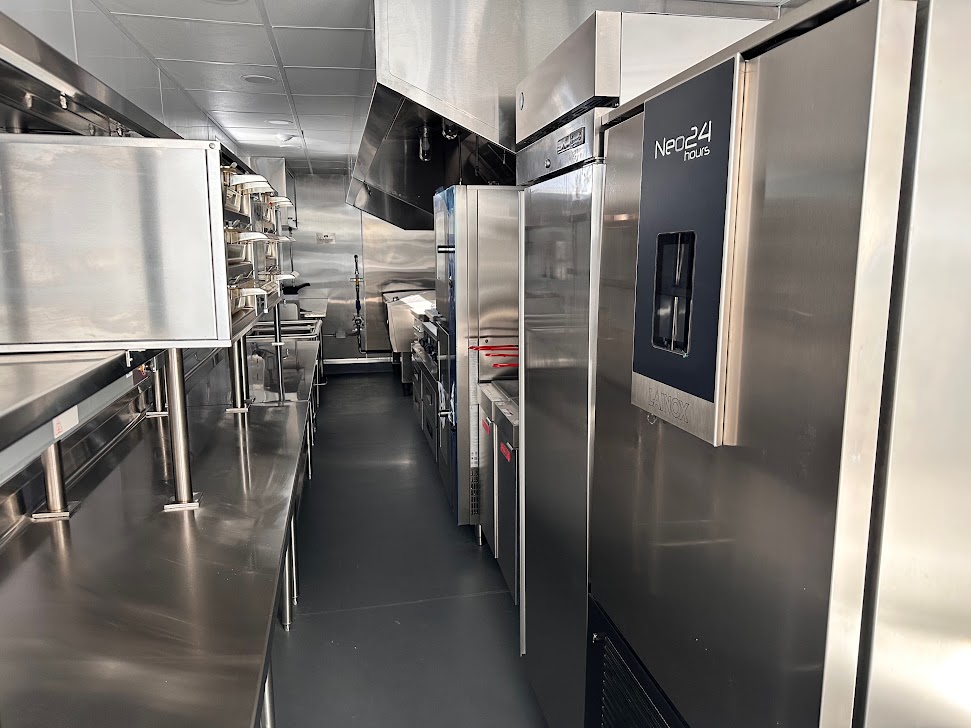
Why Choose Mobile Culinaire for Event & Festival Foodservice
Industry-Leading Experts in Event Kitchen Solutions
With extensive experience and over 400 mobile units delivered, Mobile Culinaire is a trusted partner for event organizers, festival producers, and foodservice contractors across the country. Our team understands the unique demands of large-scale, high-traffic events and delivers solutions that are efficient, compliant, and built for performance under pressure.
Durable, Commercial-Grade Kitchen Trailers
Every Mobile Culinaire unit is built in-house to meet the rigorous standards of commercial foodservice. Built to endure continuous use in outdoor and high-volume environments, our mobile kitchens maintain food safety and operational consistency throughout multi-day festivals and dynamic event settings.
Rapid & Hassle-Free Deployment
When event timelines are tight, speed and reliability matter. Our streamlined deployment process gets you up and running within 24–72 hours. From permits and transportation to utility setup, we handle the logistics so your culinary teams can focus on what they do best: serving unforgettable meals.
Complete Mobile Event Infrastructure
Beyond kitchens, Mobile Culinaire offers integrated support units including refrigeration trailers, prep kitchens, dishwashing units, and dry storage trailers. These add-ons work in tandem with your mobile kitchen to create a full-service, health-code-compliant foodservice ecosystem on-site.
Flexible & Scalable Layouts for Any Crowd
Whether you’re feeding 500 VIP guests or serving grab-and-go meals to 20,000 festival goers, our modular kitchen designs scale to meet your production needs. Each layout is tailored for event flow, menu style, and compliance with local health and fire codes, ensuring smooth operations from setup to shutdown.
Unit Sizes & Capacities
You can choose from a range of unit sizes tailored to your event’s volume and menu requirements:
- 32′: Ideal for smaller events and support kitchens, capable of preparing 150–200 meals per service.
- 40′: A versatile option suited for mid-sized crowds, producing 200–250 meals efficiently.
- 53′: Our most popular unit for large-scale events, designed to handle 300–450 meals per service with ample prep and cook space.
- 2×53′: For the largest productions, this configuration supports 500–650 meals, enabling high-volume throughput without compromising quality or speed.
%2520(1).jpeg)
Conclusion and Next Steps
Large-scale events and festivals demand seamless, high-capacity foodservice that doesn’t falter under pressure. Whether you’re planning a luxury wedding, a multi-day music festival, or a culinary expo, mobile kitchens offer a strategic, flexible, and cost-effective solution without compromising on quality, safety, or guest satisfaction.
At Mobile Culinaire, we specialize in delivering premium, fully compliant mobile kitchen trailers that perform under pressure and elevate the foodservice experience.
Partner with Mobile Culinaire for Event-Ready Solutions
If you’re planning an event that requires professional-grade temporary kitchens, don’t leave it to chance. Explore our mobile kitchen fleet and discover how we can support your operation with tailored, turnkey solutions. View our mobile kitchens or contact our event kitchen specialists to design a solution that’s as dynamic as your event!
People Also Ask (FAQ)
What are the benefits of using a mobile kitchen at an event?
Mobile kitchens offer fast, flexible, and code-compliant foodservice solutions. They reduce setup time, eliminate the need for permanent infrastructure, and can be scaled to fit events of any size, all while ensuring food safety and operational efficiency.
How quickly can a mobile kitchen be set up for an event?
With proper site access and utility readiness, mobile kitchen trailers can be fully operational within 24 to 72 hours. Mobile Culinaire handles delivery, and setup with your team, minimizing downtime and ensuring compliance from day one.
Are mobile kitchens suitable for remote or off-grid event locations?
Yes, in the absence of electric, gas, water and sewer, mobile kitchens can use electric generators, clean and waste water tanks, and propane tanks to operate.
Testimonial
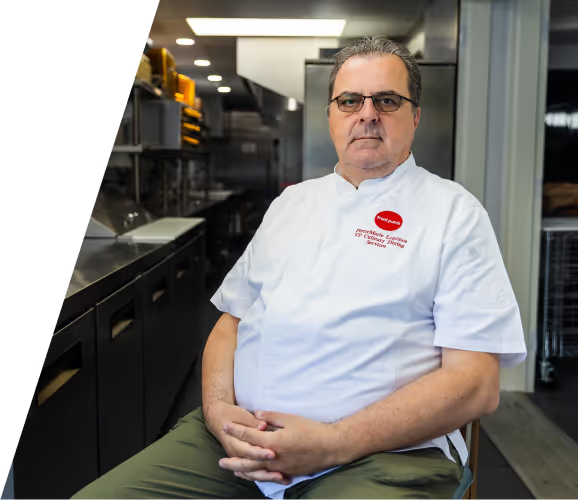
"What is standing out when you look at the mobile kitchen operation is the efficiency that we can really achieve because it's built for that."
Tell us about your kitchen needs and request a quote.
.png)
Turnkey mobile kitchen
.png)
Proudly made in-house in the USA
.png)
Commercial grade kitchen equipment
.png)
Code-compliant
Trusted by Industry Leaders



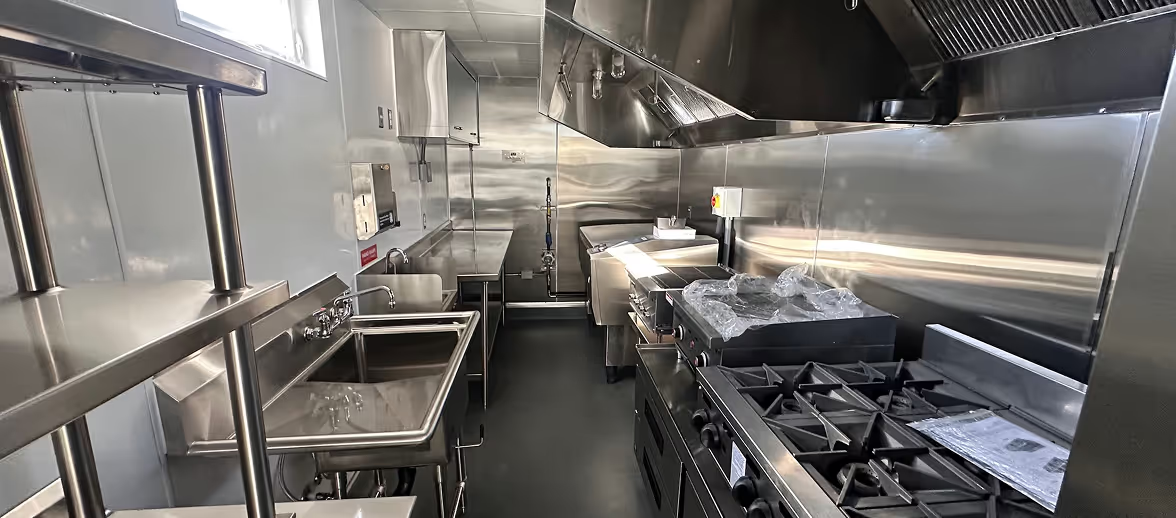
.gif)

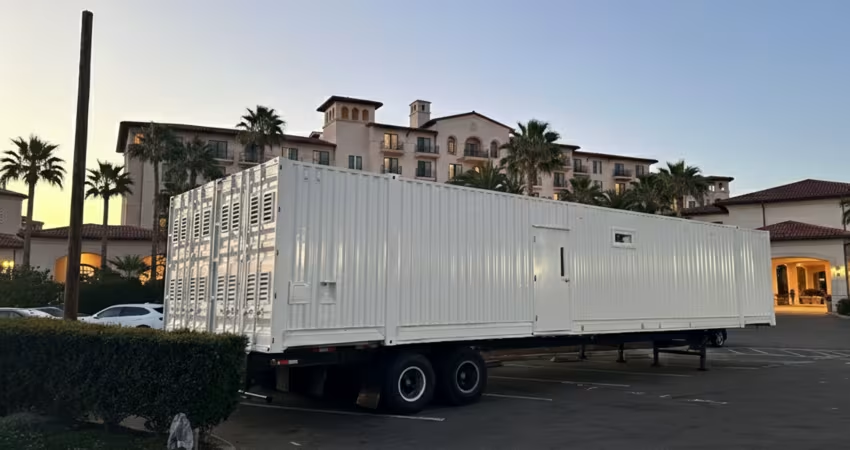
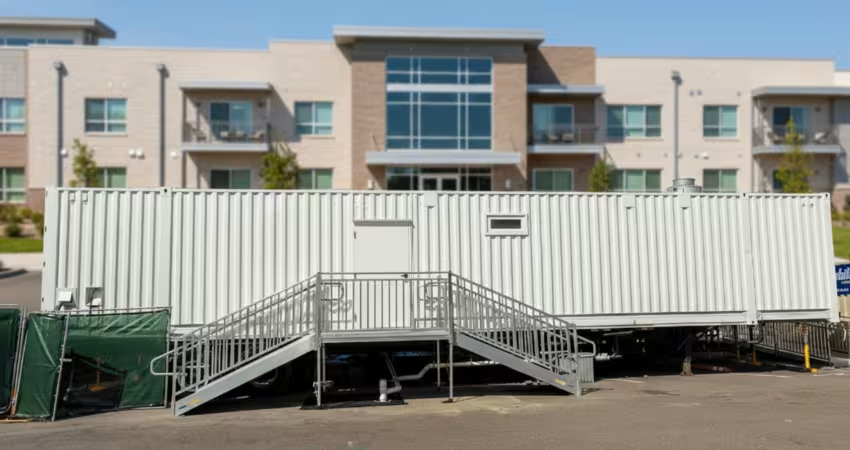
%20(1)%20(1).avif)